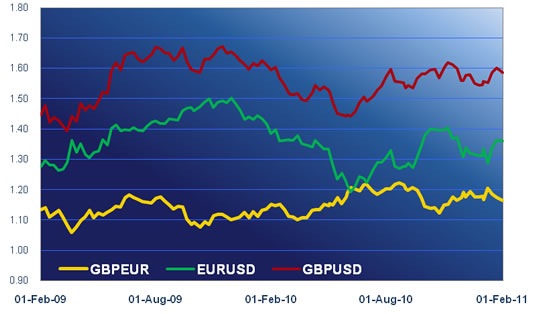| Technical levels | |||||||||||||
|
|||||||||||||
| Economic releases | |||||||||||||
|
|||||||||||||
Good morning. Twenty general practitioners in Surrey are testing a system that uses a call centre to handle appointment requests. Perhaps such an arrangement could allow the government to sidestep the controversial European court ruling that gives convicts the vote, rather than going head-to-head against Strasbourg and risking an open-ended litigation bill. The prime minister could comply by giving prisoners the vote but requiring them to cast it through a call centre. “If you would like a list of all the candidates who support capital punishment press one; if you are only serving time for something trivial like aggravated assault press two; if you were fitted up or it was all a big mistake press three; if you are trying to make a doctor’s appointment press one-one-one; to return to the previous menu press nine.”
And to make sterling jump two cents higher against everything press 0.75. There is little chance that the Monetary Policy Committee will make that decision today and equally little chance that the statement announcing the decision will be any different from those that the Bank of England has been churning out since July last year. Investors will have to wait until 23 February for the minutes of today’s meeting but that will not prevent them from forming their own anticipation of how the committee might have voted. Comments in today’s press from former MPC members DeAnne Julius and Tim Besley are illuminating. Both say they would vote for a rate increase but only if there was a majority in favour of no-change. They believe the MPC should pave the way for higher rates but that the time to begin the tightening process is not yet ripe.
Nevertheless, the market is convinced that a rate increase is on the way. That is perhaps why they totally ignored the announcement of a record UK trade deficit in December. Sterling did not even flinch. In fact it had a fairly successful day, holding its own against the US dollar and edging higher against everything else except the euro, where it lost quarter of a cent. The principal mood on Wednesday was one of heightened caution. Equity prices were subdued and the commodity dollars moved lower, partly as a result of China’s interest rate increase the previous day. The euro’s relative success seemed accidental. If anything, news that Bundesbank president Axel Weber had withdrawn his candidacy to replace Jean-Claude Trichet at the European Central Bank ought to have depressed the euro. Herr Weber, who will be retiring, has been one of the ECB’s most vocal policy hawks and his departure will be seen as softening the ECB’s stance.
There is no chance of any softening in the States. The Federal Reserve’s policy stance is already as soft as they come. Fed Chairman Bernanke told congress yesterday that “we do not now have a problem” with inflation. He said the current $600 billion round of quantitative easing would run through to completion in June unless inflation picked up or the economy began to grow “very quickly”. Mr Bernanke has no intention of tightening policy any time soon.
The announcement of 24k new jobs in Australia and an unemployment rate unchanged at 5.0% was, ostensibly, good for the Australian dollar but after a moment’s consideration investors decided they did not like the details. Their problem was that all the new jobs – and more – were part-time positions. Full-time employment went down by -8k in January. Although the eventual reaction of the Aussie was negative it was not excessively so. Investors are aware that the floods in Queensland are having an effect, but they don’t know by how much the employment data are being distorted.
Today’s agenda is rather fuller than those earlier in the week. From Europe come Swiss inflation and the industrial production figures for France, Italy and Britain. US weekly jobless claims and the Canadian new housing price index are out after lunch, followed by US wholesale inventories and the monthly budget statement. The NIESR estimate of UK economic growth in January will appear at some point and the REINZ index of New Zealand house prices comes out tonight.
Sterling’s test will come at midday when the MPC reveals its policy decision. Whilst it is unlikely that rates will go up today there is an outside chance that they might. This will mean a tilt towards long positions ahead of the announcement and the possibility of a minor sell-off for sterling if nothing changes.






